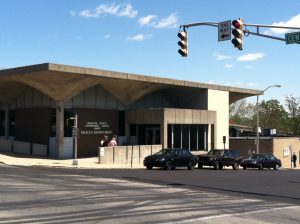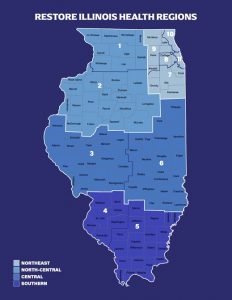Much of Southwest Illinois complies with state orders as recovery nears
By Bob Pieper for Chronicle Media — May 18, 2020A controversial “Recommended Guidelines for the Responsible Reopening of Madison County” appears to have spurred relatively little resurgence in businesses or social activity during its first week in place, a new county business tracking system suggests.
However, Gov. J.B. Pritzker (D) confirmed last week that Southern Illinois, like the rest of the state, is on track to enter Phase 3 of his statewide Restore Illinois economic recovery program — which will allow reopening of many types of businesses, as well as churches and many non-profits organization, provided social distancing and other restrictions are in place to prevent spread of COVID-19.
Approved by the Madison County Board of Health, during a teleconferenced May 12 special meeting, the county guidance outlines a four-step economic recovery program — with most businesses and other entities able to resume operations, subject to social distancing and other restrictions, in the first phase. The guidance took effect May 13.
The Madison County Board of Health consists of the members of the Madison County Board.
During the meeting, Madison County Board Chairman Kurt Prenzler (R) and several other county board members emphasized that the document provides recommendations — not binding orders or legal advice — and questions remain its status within Illinois law.
Section 7 of the guidance notes that businesses, which open during the CIVID-19 pandemic, face potential legal liability if patrons contract the coronavirus while on their premises.
Moreover, business insurance may not cover claims related to COVID-19, the guidance also notes.
Businesses regulated by the Illinois Department of Financial and Professional Regulation, such as health care practices, could face sanction or loss of license, several board members warned.
Business owners, as well as proprietors of non-profit institutions, should consult their attorneys and insurance carriers before reopening, several board members emphasized during their special meeting.
The Madison County guidelines were issued a day after Pritzker warned that Illinois might withhold state funding from counties that violate terms of his Restore Illinois economic restart program.
The county recommendations were also issued on the same day that Anthony Fauci, M.D., director of the National Institute of Allergy and Infectious Diseases, warned, in U.S. Senate testimony, that restarting the U.S., economy faster than indicated in U.S. Centers for Disease Control and Prevention guidelines, could mean new outbreaks of COVID-19 and ultimately further harm to the U.S. economy.

The Madison County Board of Health (County Board) voted 26-2 on May 12, to allow businesses and places of worship to reopen starting that day. Despite that formal vote, there was little evidence that residents or businesses ramped up their activities over the past week. (Photo courtesy of Madison County)
The Madison County cities of Alton, Collinsville, East Alton, Edwardsville, Maryville, and Troy all immediately issued statements urging continued compliance with executive orders issued by Gov. Pritzker.
Public statements from Bethalto and Granite City urge businesses and organizations to consult with legal counsel and insurance carriers before taking any action on reopening.
Only the City of Highland has issued a public statement backing Madison County’s reopening guidance.
At least two major statewide trade associations — the Illinois Retail Merchants Association and Illinois Restaurant Association — immediately issued statements urging businesses to maintain compliance with the state recovery plan.
At the Chronicle’s deadline, 66 businesses and nonprofits had registered their operational status on a new “Map Out Madison County” website, launched by the county May 11 to help area residents patronize local establishments during the pandemic.
Of those, 38 reported they were open for business — though almost all restricted to curbside, online or telephone service.
Thirteen more reported being open with altered hours.
Sixteen used the site to report they are closed due to the pandemic.
As of the Chronicle’s deadline, neither Monroe nor St. Clair county, nor any Metro East collar county, had, in any formal capacity, encouraged the opening of businesses more quickly than indicated in the statewide Restore Illinois plan.
Priztker’s Restore Illinois strategy calls for a five-phase easing of isolate-in-place orders, with four regions — Northeast Illinois, North-Central Illinois, Central Illinois and Southern Illinois — each allowed to gradually proceed with business and activity restoration, based on COVID-19 prevalence within the region.
The Southern Illinois region consists of 25 counties including the Metro East counties of Bond, Clinton, Madison, Monroe, Randolph, St. Clair and Washington.
All four of the regions were already effectively in Phase 2 of the program, when it was announced on May 5, according to the governor’s office.
Gov. Pritzker announced, May 14, that all four regions have reached, or are approaching, statistical thresholds for entry into Phase 3.
To enter Phase 3, a region must have:
- A positive COVID-19 test rate of 20 percent or less, with no increase of more than 10 percent in that rate over a 14-day period;
- No increase in hospital admissions for coronavirus-like symptoms for at least 28 consecutive days and;
- A 14 percent surge capacity in hospitals.
At the end of last week, according to the Illinois Department of Public Health, the Southern Region had:
- A test positivity rate of 7.9 percent,
- A 4 percent decrease in positive test results over the previous 14 days,
- A 61.5 percent decrease in COVID-related hospital admissions since May 1,
- Forty-five percent of its medical or surgical hospital beds available for use in the event of a COVID resurgences, with
- Twenty eight percent of its intensive care unit (ICU) beds available, and
- Seventy-six percent of its ventilator inventory available for use.
However, because of the second requirement, no region will be able to reach Phase 3 before May 29, when Illinois’ statewide isolate-in-place order, issued on March 20, is set to expire anyway, the governor notes.









